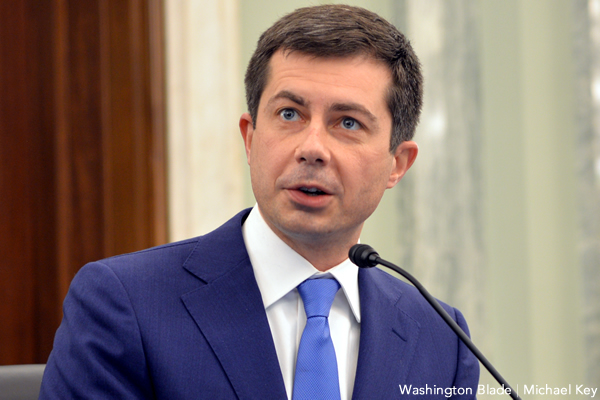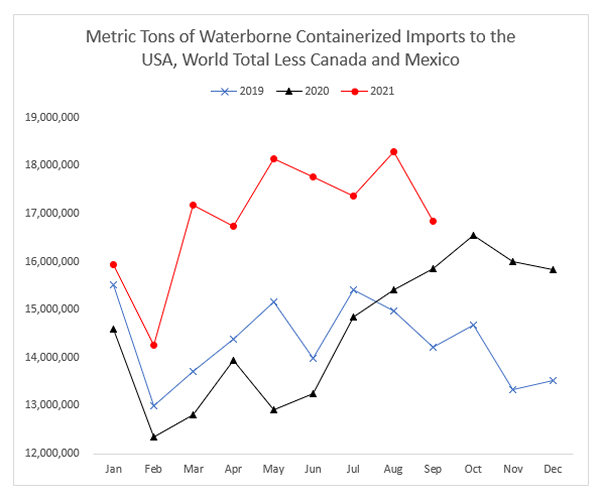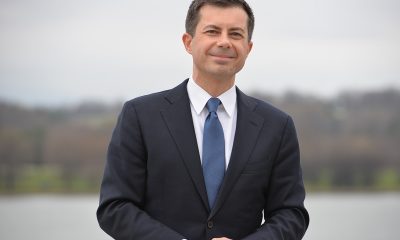Politics
Business experts split on criticism of Buttigieg on supply chain issues

Amid images of goods stranded on ships near America’s ports and notable price increases in basic commodities, including food and gasoline, right-wing critics are lambasting Pete Buttigieg in his role overseeing the supply chain as transportation secretary, although business experts in the field are split over whether that criticism is valid.
Business experts who spoke to the Blade — and whose own views may be colored by their political affiliations — offered a range of explanations for the break down in the supply chain, such as a sharp increase in demand among American consumers, the coronavirus pandemic, and a shortage of truck drivers responsible for transporting goods, which led to different conclusions as to whether Buttigieg, the first openly gay person confirmed by the U.S. Senate for a Cabinet position, was responsible.
Daniel Innis, a professor at the University of New Hampshire Peter T. College College of Business and Economics and who specializes in marketing and logistics and is a board member of Log Cabin Republicans, said criticism of Buttigieg is “certainly warranted” because he isn’t showing leadership in bringing stakeholders to the table.
“Pete can help by sitting down with the trucking industry, the railroads and so on and saying, ‘Look, this is a crisis that we have to solve,'” Innis said. “Eventually, you know, we’re going to get to a place where things that are really important aren’t available to us, and this has to be fixed. So you know, we need some leadership coming from Mayor Pete.”
As a result of supply chain issues, consumers are seeing increased prices for goods, including basic necessities like food and gasoline. With the Thanksgiving holiday fast approaching, experts say prices for turkey could be the most expensive in history for American consumers.
Innis, who said the supply chain depends on flow and “if any part of the chain breaks down, the whole thing collapses,” said the problem he’s hearing is on the receiving end at terminal hubs where truck drivers are supposed to pick up goods.
As an example, Innis offered a personal anecdote about being in Savannah, Ga, and seeing about 20 ships on the coastline waiting to come into the port. Such a port, Innis said, would be a first stop for goods before they’re loaded on trains and headed to terminal hubs, where truck drivers then pick it up.
“That’s where it’s breaking down,” Innis said. “Things are not getting picked up. And maybe a month or so ago, the Union Pacific Railroad basically barred anything coming out of LA for a week, so they could clear out the stuff from the Chicago terminal that wasn’t being picked up. So it seems to me based on my observation that we’ve got a real problem with truck drivers at the final destinations, and they’re not able to pick things up. So it backs up the entire system, and it’s backed up now all the way to the ocean.”
Specific things Buttigieg should be addressing with the trucking industry, Innis said, are why there is an such an acute truck driver shortage and what could be done to address it, including whether or not to change hours of service limiting the number of work hours truckers can drive each day, at least in the short term.
Other ideas Innis brought up, amid a national discussion about making community college free, was whether or not to make truck driver training free or giving 0 percent loans for the cost of school. Additionally, Innis said regulations prohibiting truckers under age 21 from driving across state lines should be scrapped.
“If you can drive from Miami to Jacksonville, which is eight hours, shouldn’t you be able to drive from Jacksonville to Charleston, which is four?” Innis said. “So you see, these are the things that he needs to be talking with the industry about, and maybe taking steps to address. And with just those little things, even if you pick up 10 or 15 percent of capacity, you have really moved things forward, maybe enough to start to gradually bring down the backlog.”
But defenders of the Biden administration say the supply chain breakdowns are complications of the increased demand, not any mismanagement at the top.
Jason Miller, associate professor of supply chain management at the Michigan State University Eli Broad College of Business, echoed the sense the blame for supply chain issues should be placed on increased demand and not Buttigieg.
“The disruptions the import supply chain is experiencing are due to record demand for imports due to record consumer spending on durable goods,” Miller said. “As such, there is nothing Secretary Buttigieg could truly do in such a scenario.”
Indeed, as Miller pointed out, waterborne containerized imports by weight through the first nine months of 2021 are up 17 percent from the first nine months of 2019, according to data from the Census Bureau obtained from USA Trade Online.
“This is why I like to characterize the import supply chain as strained due to record demand, as opposed to broken,” Miller concluded.

Innis, however, said ascribing supply chain issues to the simple increase in demand for goods — while valid in some respects — was over-simplifying matters, pointing out supply chain issues include goods produced and distributed domestically.
“Meat is not being imported from China,” Innis said. “It’s not sitting on a container, nor is bread, nor paper products nor all of these things that aren’t showing up in our stores. My nephew works at Whole Foods. He says they’re getting half shipments from companies. That is not sitting out on the ocean. And so, I’m not buying it across every category.”
Lisa Anderson, a supply chain expert and blogger with the Claremont, Calif.-based LMA Consulting Group, said Buttigieg has fallen short in his role as transportation secretary amid the supply crisis, concluding with respect to objections over his performance: “Unfortunately, the criticism is warranted.”
Among the tasks Buttigieg should take on, Anderson said, are touring the ports, talking to truck drivers and owner operators to understand the constraints from the front lines, coordinating with groups such as the Inland Empire Economic Partnership, the center of the logistics supply chain and conduit from Asia to the rest of the United States and finding ways to bridge government interests with business interests for the common good.
“It is a complex issue and will require strong leadership, involvement, collaboration, innovation and new thinking (breaking the traditional thinking) to resolve,” Anderson concluded.
Right-wing critics have seized on the supply chain issues and turned them into an indictment of the transportation secretary, who with his spouse Chasten Buttigieg, is a new parent, electing to stay on paternity leave for two months as the crisis unfolded.
Fox News’s Tucker Carlson, in a segment last month calling Buttigieg missing in action over the supply chain crisis, speculated Buttigieg may have taken off work “learning how to breast feed,” which defenders of Buttigieg denounced as a homophobic attack (although the snide comment could easily be made of a man in an opposite-sex relationship opting to go on paternity leave). Later, Carlson in a subsequent segment posited affirmative action is only the reason Buttigieg has the role of transportation secretary, implying the position was given to the former South Bend mayor and presidential candidate simply because he’s gay.
Innis, distancing himself from other critics in right-wing media despite his conservative political affiliations, said he was “not going to criticize” Buttigieg’s decision to go on paternity leave, which he called “something that is a part of life.”
The coronavirus pandemic, which disrupted livelihoods and economies from top to bottom across the globe, has also been identified as a factor in complications with the global supply chain, regardless of the administration in power.
Mahour Parast, a professor at Arizona State University’s School of Sustainable Engineering and the Built Environment who specializes in supply chain risk and resilience management, said “external shocks” can be in play with such systems and pointed to coronavirus as an example of such a disruption.
“A supply chain that is designed to be efficient (e.g. cost-effective) cannot be simultaneously resilient to disruptions,” Parast said. “This means that when disruptions such as COVID happen, the supply chain has difficulty to be responsive (because the entire system is designed to be efficient and to minimize cost). To be efficient, redundancy should be eliminated because redundancy adds cost to the system. To be resilient, redundancy is needed because it increases a system’s responsiveness.”
As an example of an eliminated redudancy that could end up being needed in a supply chain crisis, Parast pointed to the decision to move operations overseas to benefit from lower production cost or access to raw materials, which he said leads to cost savings at the expense of responsiveness and agility.
“One can make supply chains more resilient by regionalizing supply chain operations in which case there are several locations to back up each other in case of disruptions,” Parast said.
The Biden administration, for its part, has declared steps it would take to ease supply chain issues, mostly consistent with the dispersement of U.S. government money as a short-term solution. On Tuesday, the White House announced funding for a pop-up container yard project underway at the Port of Savannah, a $420 million grant program for ports and marine highways launched within the next 45 days and identifying coastal and waterway projects by the U.S. Army Corps of Engineers construction.
The White House announcement comes days after President Biden signed into law the bipartisan infrastructure package after months of negotiations among lawmakers, which he was set on Wednesday to promote at an event at the Port of Baltimore.
In his defense, Buttigieg has said in media appearances that supply chain issues aren’t the result of mismanagement, but prosperity and suppliers not being able to keep up under Biden administration policies seeking to lift the country up from economic stagnation.
Buttigieg, appearing on a CNN segment last month with Jake Tapper to respond to criticism about supply chain issues, said the problem exists because “retail sales are through the roof.”
“If you think about those images of ships, for example, waiting at anchor on the West Coast, you know, every one of those ships is full of record amounts of goods that Americans are buying because demand is up, because income is up, because the president has successfully guided this economy out of the teeth of a terrifying recession,” Buttigieg said. “Now the issue is, even though our ports are handling more than they ever have, record amounts of goods coming through, our supply chains can’t keep up.”
In June, the Biden administration set up a supply chain disruptions task force, which is led by the secretaries of commerce, transportation, and agriculture and charged with focusing on areas where a mismatch between supply and demand has been evident: homebuilding and construction, semi-conductors, transportation and agriculture and food.
A Department of Transportation spokesperson, asked by the Washington Blade to comment for this article, said Buttigieg in his role as co-chair of the Task Force “is focused on ensuring that the Department is doing all it can to address these issues and has made progress along the way.”
Among other examples, the spokesperson pointed to the Ports of Los Angeles and Long Beach announcing they would expand hours of operation; new support for paid apprenticeship programs in the truck driving industry; and Union Pacific railroad announcing it would go to 24/7 operations.
Innis, at the end of the day, rejected the idea Buttigieg’s hands were tied, saying despite increased demand causing blockages in the supply chain “there are steps that can be taken to ease it, and those are not being taken.”
“When you drill down into certain product categories, there are severe problems that aren’t being addressed that have nothing to do with the oceans, or even the trains,” Innis said. “Because your bread isn’t riding on a train. It’s on a truck coming from a local area. And these shortages are real. You walk through the grocery store, you see it.”
Congress
Congress passes ‘Big, Beautiful Bill’ with massive cuts to health insurance coverage
Roughly 1.8 million LGBTQ Americans rely on Medicaid

The “Big, Beautiful Bill” heads to President Donald Trump’s desk following the vote by the Republican majority in the U.S. House of Representatives Thursday, which saw two nays from GOP members and unified opposition from the entire Democratic caucus.
To partially offset the cost of tax breaks that disproportionately favor the wealthy, the bill contains massive cuts to Medicaid and social safety net programs like food assistance for the poor while adding a projected $3.3 billion to the deficit.
Policy wise, the signature legislation of Trump’s second term rolls back clean energy tax credits passed under the Biden-Harris administration while beefing up funding for defense and border security.
Roughly 13 percent of LGBTQ adults in the U.S., about 1.8 million people, rely on Medicaid as their primary health insurer, compared to seven percent of non-LGBTQ adults, according to the UCLA School of Law’s Williams Institute think tank on sexual orientation and gender identities.
In total, the Congressional Budget Office estimates the cuts will cause more than 10 million Americans to lose their coverage under Medicaid and anywhere from three to five million to lose their care under Affordable Care Act marketplace plans.
A number of Republicans in the House and Senate opposed the bill reasoning that they might face political consequences for taking away access to healthcare for, particularly, low-income Americans who rely on Medicaid. Poorer voters flocked to Trump in last year’s presidential election, exit polls show.
A provision that would have blocked the use of federal funds to reimburse medical care for transgender youth was blocked by the Senate Parliamentarian and ultimately struck from the legislation — reportedly after the first trans member of Congress, U.S. Rep. Sarah McBride (D-Del.) and the first lesbian U.S. senator, Tammy Baldwin (D-Wis.), shored up unified opposition to the proposal among Congressional Democrats.
Congress
Ritchie Torres says he is unlikely to run for NY governor
One poll showed gay Democratic congressman nearly tied with Kathy Hochul

Gay Democratic Congressman Ritchie Torres of New York is unlikely to challenge New York Gov. Kathy Hochul (D) in the state’s next gubernatorial race, he said during an appearance Wednesday on MSNBC’s “Morning Joe.”
“I’m unlikely to run for governor,” he said. ““I feel like the assault that we’ve seen on the social safety net in the Bronx is so unprecedented. It’s so overwhelming that I’m going to keep my focus on Washington, D.C.”
Torres and Hochul were nearly tied in a poll this spring of likely Democratic voters in New York City, fueling speculation that the congressman might run. A Siena College poll, however, found Hochul leading with a wider margin.
Back in D.C., the congressman and his colleagues are unified in their opposition to President Donald Trump’s signature legislation, the “Big Beautiful Bill,” which heads back to the House after passing the Senate by one vote this week.
To pay for tax cuts that disproportionately advantage the ultra-wealthy and large corporations, the president and Congressional Republicans have proposed massive cuts to Medicaid and other social programs.
A provision in the Senate version of the bill that would have blocked the use of federal funds to reimburse medical care for transgender youth was blocked by the Senate Parliamentarian and ultimately struck from the legislation, reportedly after pressure from transgender U.S. Rep. Sarah McBride (D-Del.) and lesbian U.S. Sen. Tammy Baldwin (D-Wis.).
Torres on “Morning Joe” said, “The so-called Big Beautiful Bill represents a betrayal of the working people of America and nowhere more so than in the Bronx,” adding, “It’s going to destabilize every health care provider, every hospital.”
Congress
House Democrats oppose Bessent’s removal of SOGI from discrimination complaint forms
Congressional Equality Caucus sharply criticized move

A letter issued last week by a group of House Democrats objects to Treasury Secretary Scott Bessent’s removal of sexual orientation and gender identity as bases for sex discrimination complaints in several Equal Employment Opportunity forms.
Bessent, who is gay, is the highest ranking openly LGBTQ official in American history and the second out Cabinet member next to Pete Buttigieg, who served as transportation secretary during the Biden-Harris administration.
The signatories to the letter include a few out members of Congress, Congressional Equality Caucus chair and co-chairs Mark Takano (Calif.), Ritchie Torres (N.Y.), and Becca Balint (Vt.), along with U.S. Reps. Nikema Williams (Ga.), Hank Johnson (Ga.), Raja Krishnamoorthi (Ill.), Delia Ramirez (Ill.), Joyce Beatty (Ohio), Lloyd Doggett (Texas), Eleanor Holmes Norton (D.C.), Josh Gottheimer (N.J.), and Sylvia Garcia (D-Texas).
The letter explains the “critical role” played by the EEO given the strictures and limits on how federal employees can find recourse for unlawful workplace discrimination — namely, without the ability to file complaints directly with the Employment Opportunity Commission or otherwise engage with the agency unless the complainant “appeal[s] an agency’s decision following the agency’s investigation or request[s] a hearing before an administrative judge.”
“Your attempt to remove ‘gender identity’ and ‘sexual orientation’ as bases for sex discrimination complaints in numerous Equal Employment Opportunity (EEO) forms will create unnecessary hurdles to employees filing EEO complaints and undermine enforcement of federal employee’s nondiscrimination protections,” the members wrote in their letter.
They further explain the legal basis behind LGBTQ inclusive nondiscrimination protections for federal employees in the EEOC’s decisions in Macy v. Holder (2012) and Baldwin v. Foxx (2015) and the U.S. Supreme Court’s decision in Bostock v. Clayton County (2020).
“It appears that these changes may be an attempt by the department to dissuade employees from reporting gender identity and sexual orientation discrimination,” the lawmakers wrote. “Without forms clearly enumerating gender identity and sexual orientation as forms of sex discrimination, the average employee who experiences these forms of discrimination may see these forms and not realize that the discrimination they experienced was unlawful and something that they can report and seek recourse for.”
“A more alarming view would be that the department no longer plans to fulfill its legal obligations to investigate complaints of gender identity and sexual orientation and ensure its
employees are working in an environment free from these forms of discrimination,” they added.
-

 U.S. Supreme Court3 days ago
U.S. Supreme Court3 days agoSupreme Court to consider bans on trans athletes in school sports
-

 Out & About4 days ago
Out & About4 days agoCelebrate the Fourth of July the gay way!
-

 Virginia4 days ago
Virginia4 days agoVa. court allows conversion therapy despite law banning it
-

 Opinions4 days ago
Opinions4 days agoCan we still celebrate Fourth of July this year?












